Responsible and sustainable tourism is increasingly showing up on tourists’ radar. Kim Emmanuel looks at different options, ranging from voluntourism to options where guests can support disadvantaged communities.
1. Wilderness Leadership School
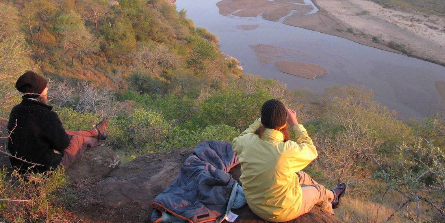
The Wilderness Leadership School offers an educational experience to both South African youth and overseas visitors.
The Wilderness Leadership School trails experience directly funds community trails, training bursaries and community-based projects, says Renier Friis, Welcome’s Product Development & Contracting General Manager. The funding also ensures that the experience is made available to people from disadvantaged communities and allows the organisation to bring about awareness of the natural environment through experiential education.
There are trails in iMfolozi Game Reserve, iSimangaliso World Heritage Site, Drakensberg World Heritage Site, Wild Coast (Eastern Cape), Pilanesberg National Park and in the Okavango Delta. Each trail accommodates between six and eight travellers, and two experienced, armed guides lead each trail. Guides are trained to ensure the safety of travellers during encounters with wildlife such as rhino, lions, elephants, and buffalo when on foot.
Travellers will set up camp in an area chosen by the guide and sleep under the stars.
2. Calabash’s community volunteer programmes
Calabash Tours, together with People and Places, offers volunteer opportunities for individuals, schools, universities, and special-interest groups.
Tourists who are interested in getting involved in voluntourism projects will be screened by People and Places, who will check a number of requirements, including lack of a criminal record as well as the skills of the individuals. Individuals are then assigned tasks based on their skill set; this may be office work, agricultural or gardening projects, or teaching.
When they arrive, tourists are taken on an orientation tour of the community they will be working in, as well as Calabash’s Real City Tour. Orientation meetings are also conducted with volunteers to help them with cultural awareness and any other challenges they may come across during their stay.
Tourists can choose how long they wish to be involved in the project, with many choosing to stay for a couple of months, and even returning each year to continue the work on their project.
3. Rhino Conservation Safari
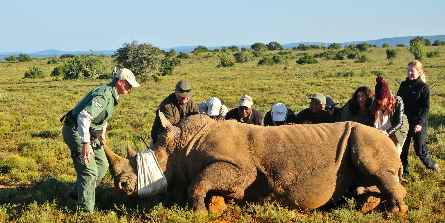
Kwandwe Private Game Reserve in the Eastern Cape, offers guests the opportunity to help preserve an endangered species through its Rhino Conservation Safari.
Guests participate in the darting, notching and DNA sampling process for conservation purposes, while the experience also provides insight into Kwandwe’s Black and White rhinos and their differentiating behavioural patterns.
A group of up to eight guests undergo full briefings and are allocated specific roles before accompanying Angus Sholto-Douglas (MD and Conversation Manager) and a wildlife vet to explore the reserve to spot the rhino. Once the animal has been darted and sedated, the participants join the specialist ranger team on the ground and play their role in administering any further medication, taking measurements for scientific and medical purposes and monitoring the animal while it is under sedation.
Guests will also have an opportunity to drill the rhino horns for the insertion of microchips and perform ear-notching procedures for future identification – both essential tasks to ensure the preservation of the species. Once the procedure is complete, guests also have the opportunity to take a short aerial exploration of the reserve by helicopter.
All proceeds go to rhino conservation.
4. Uthando South Africa
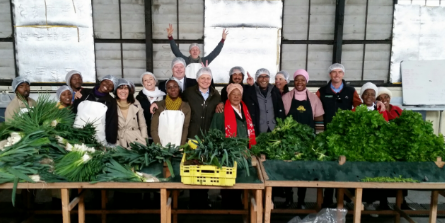
Credit: Uthando SA
Uthando, a non-profit and Fair Trade Tourism-accredited organisation, makes use of philanthropic tours and experiences to raise funds for community development projects in South Africa.
The Uthando Tour discusses South Africa’s history as well as some of the political, social, economic, cultural and local issues facing the country today. However, the focus of the tour is to visit interesting and inspiring community development projects and meet the people driving them.
The scheduled or private tours are for groups of any size and run from Monday to Saturday. On any given tour, three or four community projects are visited. They include urban agriculture, animal welfare, youth development through the medium of art, dance, choir singing, classical music, drumming or sport, and many more. Requests can be made to visit a specific project or projects, subject to availability.
Guides provide information on local greetings and customs at the outset of the tour to enable guests to engage with locals in a respectful manner. There is also a ‘Guest Code of Conduct’ available on Uthando’s website, outlining some guidelines to ensure the tour is conducted respectfully.
5. Community, education, and conservation programmes
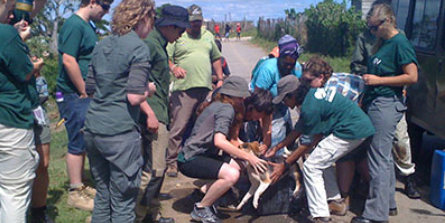
Wildlife volunteering programme in South Africa
Volunteer Africa 32 Degrees South works with schools in the Cintsa area of the Eastern Cape, as well as on other programmes in both South Africa and Malawi. Projects include wildlife and conservation programmes, teaching, and group volunteer programmes.
Programmes are structured to make sure volunteers know exactly where they need to be, what tasks they are fulfilling and why. Volunteers also get 24-hour support from experienced, on-site programme co-ordinators and also from staff.
The programme includes all transport, meals, accommodation, and orientation. A large percentage of the programme fee goes directly to the schools, projects and reserves, with the remainder covering running costs such as food, fuel, accommodation and staff salaries.
Once they leave Cintsa, volunteers receive newsletters on a monthly basis through email and social media channels, keeping them up to date with the programme, and encouraging them to participate in fundraising campaigns.
6. Lalibela’s environmental rehabilitation project
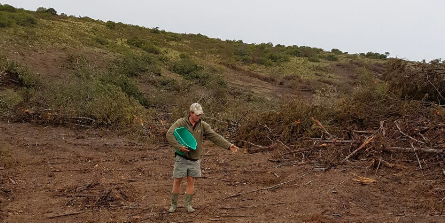
Grass and acacia seeds being scattered on an area of Lalibela that has been cleared of alien invasive plants.
Lalibela Game Reserve has invested a lot of effort in removing the reserve’s alien vegetation, and now guests have a chance to get involved in the project too. “We’re finding that our guests are very interested in hearing more about this programme,” says Vernon Wait, Marketing Director.
Guests are shown where alien vegetation has been removed and have the opportunity distribute various grass seeds that form savanna grassland. The activity also forms part of an education programme where guests are taught about the holistic value of nature. “Going on safari is not just about seeing a lion or an elephant; everything is in balance. So they have to understand the importance of the flora because without the specific plants, you wouldn’t have the animals,” explains Wait.
The activity is led by an experienced guide during down time between game drives.























